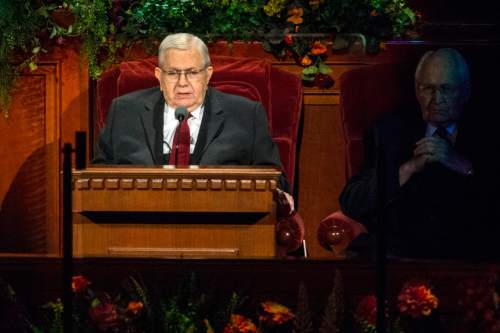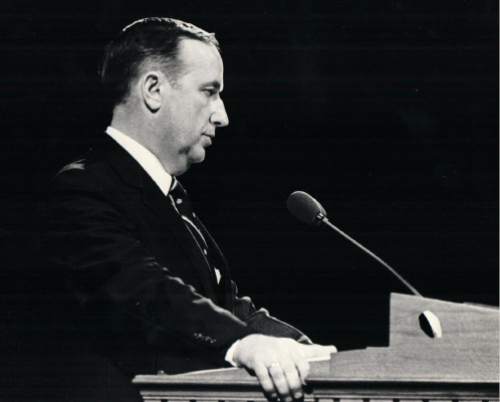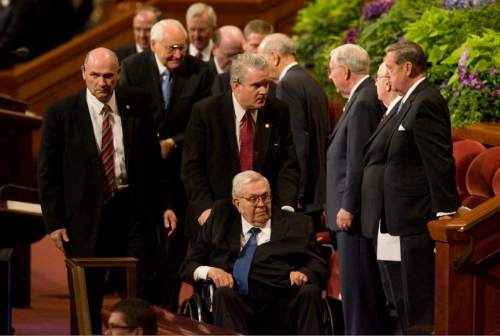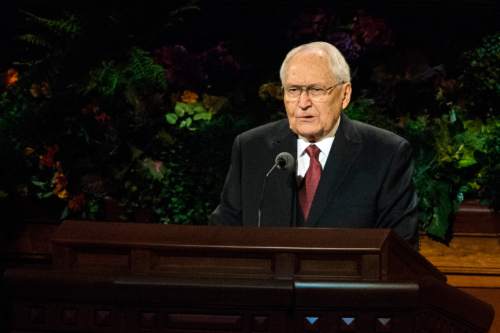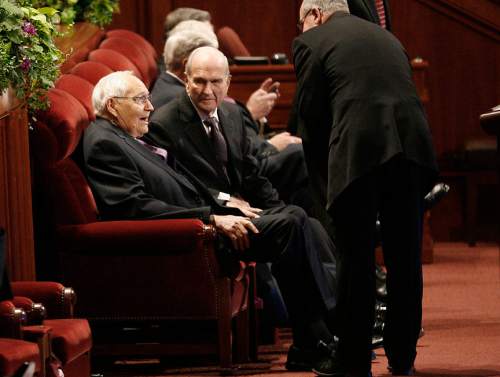This is an archived article that was published on sltrib.com in 2015, and information in the article may be outdated. It is provided only for personal research purposes and may not be reprinted.
Now there are three vacancies.
The death Tuesday of high-ranking LDS leader Richard G. Scott, 86, left a quarter of the positions open in the Utah-based faith's Quorum of the Twelve Apostles, a void not seen since 1906.
Scott's passing follows the deaths of 90-year-old Boyd K. Packer on July 3, just five weeks after his 92-year-old apostolic colleague, L. Tom Perry, lost a battle with cancer.
Most members in The Church of Jesus Christ of Latter-day Saints expected their top leaders to name two new apostles at the 185th Semiannual LDS General Conference, which begins Saturday with a women's session and continues Oct. 3 and 4. But there is no requirement to do so.
Now, with Scott's death, it is unclear whether they will name a third man to the all-male quorum at the fall conference, just the previous two, or none at all.
Noted Mormon sociologist Armand Mauss said it is entirely possible that the LDS Church will name three apostles at next week's gathering.
"If they have made a decision about first two openings, almost certainly there are two or three others who were highly ranked in these deliberations," Mauss said from his home in Irvine, Calif. "It seems likely to me that it would be fairly easy— even in a short time — to come to closure on one of those."
Such replacements might alter the quorum's makeup, Mauss said, given that two of the three late apostles — Packer and Scott — were religious conservatives.
This could "restore the balance that was there before," he said, "and open the way for some kind of reconfiguration of idealogical temperament."
The last time the church's Quorum of the Twelve Apostles had a two-man vacancy came in July 2004, with the deaths of apostles David B. Haight and Neal A. Maxwell. Dieter F. Uchtdorf and David A. Bednar were named in October that year as replacements.
But three openings among the Twelve haven't been seen since 1906.
Two apostles, John W. Taylor and Matthias W. Cowley, resigned from the faith's second-highest quorum for continuing to officiate at Mormon polygamous "sealings," or weddings, after the church had discontinued the practice. Apostle Marriner Merrill then died in February 1906.
The three were replaced at the April Conference that year, according to the LDS Church Almanac, by George F. Richards, Orson F. Whitney and David O. McKay. The latter became the church's ninth president in April 1951.
Whenever the new men are chosen, they will take their places at the bottom of the quorum, right after Neil L. Andersen, who became an apostle in 2009 after Joseph B. Wirthlin died the previous December.
The new apostles don't have to come from within the current top LDS leadership. Russell M. Nelson, now the president of the Twelve, was a heart surgeon, and Dallin H. Oaks, who was ordained an apostle just weeks after Nelson, was a Utah Supreme Court justice.
"Apostles are chosen through inspiration by the president of the church," the faith's website explains, "sustained by the general membership of the church, and ordained by the First Presidency and Quorum of the Twelve Apostles."
All Mormon apostles are seen by members as "prophets, seers and revelators" and serve for life. The man who outlives the apostles named before him ascends to the LDS Church's highest office. Right now, that man is Thomas S. Monson, who, at age 88, the church has said, is "feeling the effects of advancing age."
Though they have no say in the process of selecting apostles, some Mormons hope a non-American joins Uchtdorf, a German who now serves as second counselor in the governing, three-member First Presidency.
After all, the percentage of Spanish-speaking members now accounts for more than a third of the world's 15 million Latter-day Saints, inching ever closer to the 41 percent who communicate in English.
If not a Latino, many of the devout would like to see at least one of the new apostles who hails from beyond the usual "Mormon corridor" in the western U.S.
Such a move would, LDS demographer Matt Martinich said earlier this year, "signify an important step in the internationalization of the church."


